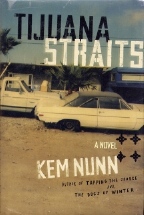Tijuana Straits
Kem Nunn
Simon and Schuster
US Hardcover First Edition
ISBN 0-684-84305-6
Publication Date: 08-10-2004
307 Pages; $25.00
Date Reviewed: 08-20-04
Reviewed by: Rick Kleffel © 2004

REFERENCES
COLUMNS
|
|
|
Tijuana StraitsKem NunnSimon and SchusterUS Hardcover First EditionISBN 0-684-84305-6Publication Date: 08-10-2004307 Pages; $25.00Date Reviewed: 08-20-04Reviewed by: Rick Kleffel © 2004 |
|
|
REFERENCES |
COLUMNS |
Abrupt change and extremes characterize the landscape of a border. The boundaries may be between countries, between the land and the sea, between men and women, between reality and hallucination. But that indeterminate space where one thing changes to another is a vortex of possibilities, where perception defines reality, where personality, where one's worth are declared and exposed. In that shifting landscape, the tidal region between is and is not, the frail light of humanity shines the brightest, or casts the darkest shadow. In the borderland, what we are inside comes as close to the surface as it can. The waves that carry us from one place to another, from one life to another, the tides that pull sand from the land and take it out to sea show us for what we are.
On the border between California and Mexico, between land and sea, Kem Nunn finds Sam Fahey, a man who could have been a contender in the world of big-wave surfing, but was carried away by the white trash currents of his childhood on the border. In 'Tijuana Straits', Nunn brings readers his powerful novel to date, a compelling story of wasted potential and potential danger. The filth of our country runs down the rivers and slops into the streets of Tijuana, creating monsters of men. Nunn's powerful novel is blisteringly savage and painfully perceptive. We're poisoning ourselves. We may be dead and not even know it.
Long past his glory days as a young surfer, long past even his days as a drug runner and small-time criminal, Sam Fahey is now an older-than-his-age employee of the government who tends to the endangered species that manage to survive in Tijuana Straits, the small valley just north of the border. When he saves the beaten, bruised and almost insensible Magdalena from wild dogs roaming the sand dunes, he makes a spot decision to take her in. Magdalena is an activist from over the border, who is fighting the multi-national corporations that have created the toxic wastelands known as the maquilladoras. She's uncertain how or even why she arrived in Tijuana Straits. Both she and Sam are soon to find out.
Nunn keeps his story close and tight. His prose is evocative and lyrical but tough and to-the-point. He creates landscapes that are so intense as to be thoroughly immersive. The tiny ecosystem of Tijuana Straits, from the Outer Peak in the ocean where the Mystic Ridge breaks, to Garage-Door Tijuana, an intricate maze of trash and treasure comes meticulously to life in Nunn's prose. He also creates the hellish world of the maquilladoras in Tijuana proper. This bleak landscape of ruin, rust and toxic waste shambles to life and itself gives birth to monsters. Every terrorizing story about bad drugs and bad neighborhoods comes to fiery life as Nunn creates the compelling and ferocious Armando Santoya.
Santoya's stories -- and the stories of his comrades from the maquilladoras -- are intense, compelling stories of terror and horror. Nunn writes powerfully and passionately enough to evoke the supernatural dread within the natural world. He peels the skin off of an ugly reality and finds the deeper ugliness within, nestled next to a humanity so stepped-upon, so beat-down, so used that the terror is intimately mixed with sympathy. Nunn's monsters are ultimately human and ultimately frightening. And for readers, nothing is quite so bracingly enjoyable as glancing in the mirror and seeing your own scarred face, sheeted in the blood of others.
But Nunn's novel isn't merely a tale of terror. The horrific landscape of the maquilladoras borders on the beauty of the Pacific Ocean. And though Sam Fahey is damaged goods through and through, he's still a human being capable of greatness. Nunn's love of the huge, cryptic slab of ocean that washes upon our shores is borne out in passages that mine the power of nature, that excavate with a single man on a single board and find somewhere on the border a purity that evokes peace. It's the purity that brings redemption, that cleanses the filth from our veins and our lives.
For all that it inhabits the borders, 'Tijuana Straits' is a decidedly American novel, in the great tradition of Pete Dexter, Flannery O'Connor, William Faulkner and Mark Twain. Nunn's America is the America of decaying suburbs, of trash-filled alleys. This is the country that spreads not democracy and wealth, but inequality and squalor. Nunn knows the old axiom that you can read a man's character by looking at his trash. He brings our country, and our fictional tradition to life by rummaging through the waste. There he finds the glorious and the discarded, the poisonous runoff from a mindless manufactory, flushed from out of sight but not out of the world.
In the midst of all the wonderful character notes, the passionate portrayals of our determined effort to destroy the beauty that gave birth to us, and the intense landscapes, both internal and external, Nunn manages to effortlessly create a compelling plot that turns the pages faster than readers will wish to see them go by. 'Tijuana Straits' is a novel that rewards readers but is an amazingly fast and easy read. Nunn's effortless performance is clearly the result of a handcrafted-prose ethic. 'Tijuana Straits' is purely organic, inspiration brought to life by perspiration and skill. Nunn's novel will cross the border between the world created for the reader and the world the reader inhabits, to spin a tale that becomes part of the reader, to join the reader in the no-man's-land where change is what you hand the homeless as you hope for yourself.